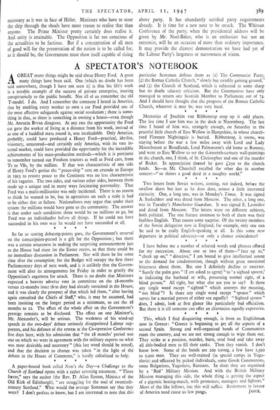A SPECTATOR 'S NOTEBOOK
AGREAT many things might be said about.Henry Ford. A great many things have been said. One (which no doubt has been said somewhere, though 1 have not seen it) is that his life's work is a notable example of the success of private enterprise, inuring conspicuously to the public benefit. Not all of us remember the old T-model. I do. And I remember the comment I heard in America, that by enabling every worker to own a car Ford provided one of the most effective safeguards against social revolution ; there is some- thing in that, as there is something in owning a house—even though Mr. Aneurin Bevan disagrees. At any rate the opportunity the Ford car gave the worker of living at a distance from his work, instead of as one of a huddled mass round it, was incalculable. Only America, probably, could have produced a Henry Ford—practical, idealist, visionary, untutored—and certainly only America, with its vast in- ternal market, could have provided the opportunity for the incredible achievements of his mass-production methods—which it is pertinent to remember turned out Fordson tractors as well as Ford cars, from Ts to V8s, by the million. If that was characteristic of one side of Henry Ford's genius the " peace-ship " sent on crusade to Europe in 1915 to restore peace to the Continent was no less characteristic of his vagaries. The two sides, and various other sides, between them made up a unique and in many ways fascinating personality. That Ford was a multi-millionaire was only incidental. There is no reason to think he wanted to be, but in operations on such a scale it had to be either that or failure. Nationalisers may argue that under their system the millions would have gone to the community. The answer is that under such conditions there would be no millions to go, for Ford was an individualist before all things. If he could not have succeeded in his own way he would not have succeeded at all.


































 Previous page
Previous page